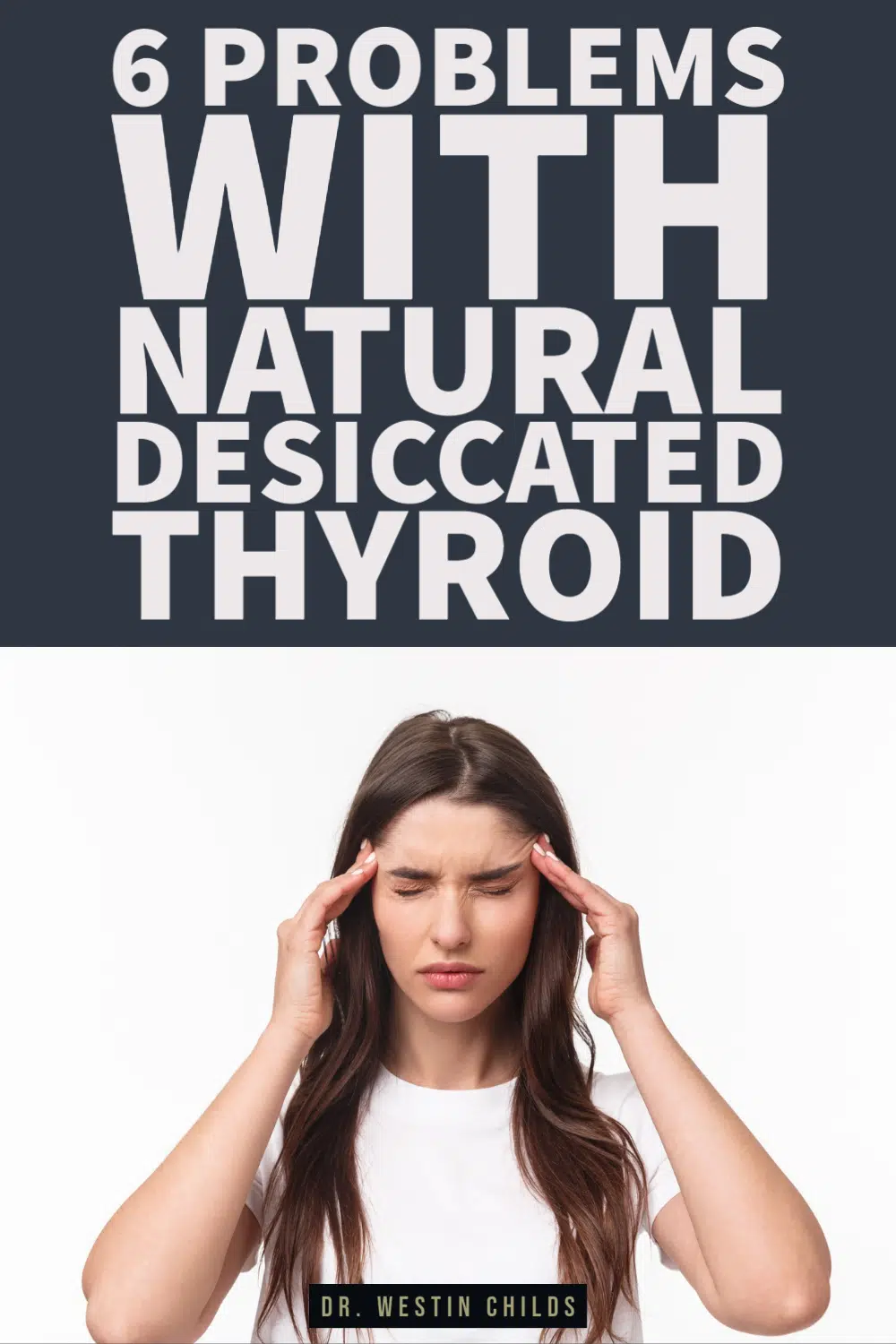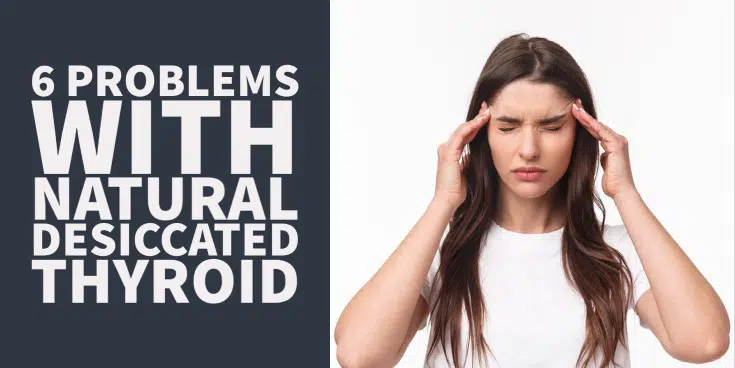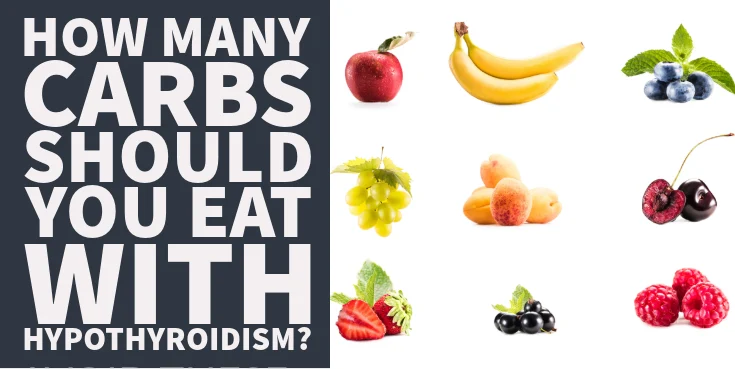Are you currently taking thyroid medication but not quite feeling like yourself?
Perhaps you’ve heard about the thyroid medication NDT (natural desiccated thyroid) and you’re wondering if this medication can solve your problems.
Before you jump into using this medication let’s take an honest and in-depth look at the pros and cons.
This article will walk you through 6 problems with NDT and elaborate on several things you’ll want to consider before using this medication.
NDT is a Great Medication but It’s not Perfect
If you’ve spent any amount of time on the internet searching thyroid forums then you’ve probably heard about NDT.
NDT is a unique thyroid medication and there is no doubt that it has helped a great many thyroid patients.
But is this medication perfect?
Not at all.
Like any medication or hormone, NDT has both positives and negatives.
And while I have many patients on NDT formulations and I think it’s a solid thyroid medication replacement, there are several things that you should be aware of BEFORE you start using it.
If you aren’t familiar with NDT then you can start here to understand the basics. Once you have those down you can come back here to get a more complete understanding of the potential downsides of NDT.
And yes, before you ask, this applies to ALL formulations of NDT including:
- Armour Thyroid
- NP Thyroid
- WP Thyroid
- Nature-Throid
- Thyrolar
- And so on
DOWNLOAD FREE RESOURCES
Foods to Avoid if you Have Thyroid Problems:
I’ve found that these 10 foods cause the most problems for thyroid patients. Learn which foods you should avoid if you have thyroid disease of any type.
The Complete List of Thyroid Lab tests:
The list includes optimal ranges, normal ranges, and the complete list of tests you need to diagnose and manage thyroid disease correctly!
#1. The Formula Keeps Changing (And there may be shortages)
This problem isn’t necessarily unique to Natural Desiccated Thyroid (and it can happen in all types of medications) but it seems to affect these medications more than others.
Throughout time, and even several times in the last 15 years, the formula for NDT (including Armour thyroid and Nature-throid) have been altered slightly.
This may not seem like a big deal, but even slight changes to the formula can have potentially big consequences for certain individuals.
Let me explain in a little more detail:
Medications contain both active and inactive ingredients.
The active ingredient(s) tend to provide the majority of the benefit from any medication.
In NDT, the active ingredients are the thyroid hormones.
The inactive ingredients are there to help stabilize the active ingredients, delay or improve absorption, and help provide color/stability to the capsule/tablet (1).
And it is these inactive ingredients that tend to be changed on a semi-frequent basis.
When these inactive ingredients are changed, even just a little bit, it can really alter how your body reacts to and tolerates the medication as a whole.

In some cases, these changes can render the effectiveness of your medication far less effective.
As an example:
In 2009 the formula for Armour Thyroid was slightly altered to include more cellulose.
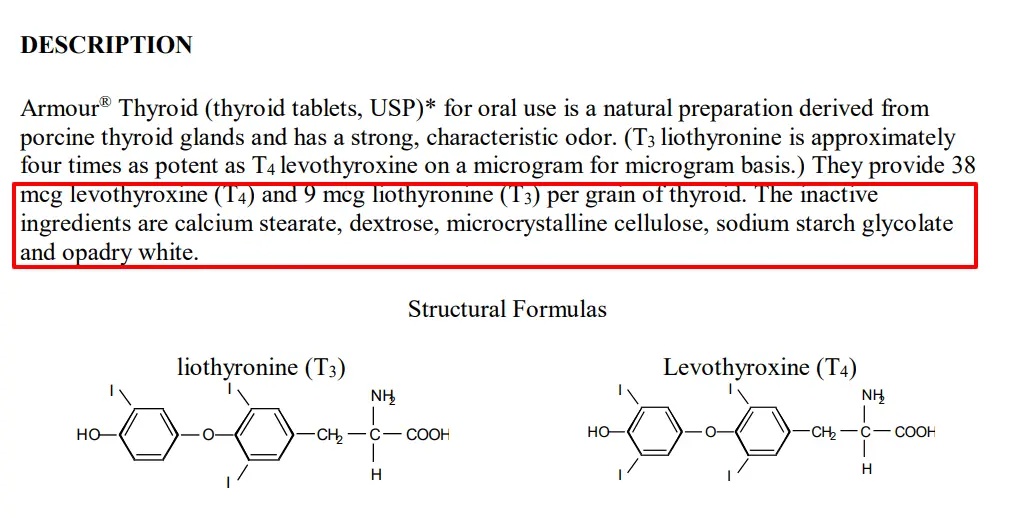
This small change resulted in several complaints from patients who were previously tolerating their medication quite well.
This problem is amplified when you consider how difficult it can be to finally find a doctor to prescribe you this medication.
As the formula changes, even slightly, you may find that your medication no longer works the way that it used to.
This has to do with how your digestive tract handles the medication, how much of the medication is absorbed, and even your reaction to inactive ingredients.
#2. It isn’t always easy to get
This is probably one of the bigger downsides to using NDT.
It’s just hard to get when compared to other thyroid medications such as Synthroid and levothyroxine.
I readily admit, and clinical studies agree (2), that most people do better when switching from T4-only medications to NDT.
I probably don’t have to convince you of that.
But, even though people tend to prefer these medications over other formulations, it doesn’t mean that they were always the best.
Why?
Because doctors don’t like prescribing them.
They generally aren’t trained to use medications that contain T3 and there is a bias against medications that are animal derived (3).
I personally saw this when I was in my residency as doctors basically told me not to use Armour thyroid (or other formulations of NDT) for that very reason.
No logic other than there is just a bias against them.
This problem is too bad for people who can afford to find a functional medicine doctor or a naturopathic doctor willing to prescribe it, but it becomes a big problem for the vast majority of people who must get care from endocrinologists and primary care physicians.
I’ve heard several accounts of patients who crash after switching from NDT back to T4-only thyroid medications.
Why don’t they just stay on NDT you might ask?
Because if your doctor changes or moves away for any reason, it is often times very difficult to find a doctor willing to prescribe NDT again.
This isn’t a reason to not use NDT, but this is definitely something that should be considered if you are considering using NDT.
#3. The Amount of T4 and T3 in Each Dose is Static (not dynamic)
This is a problem that is perhaps not appreciated by most people but it is still important.
One big downside to using NDT is that the dosing of T4 and T3 is set in stone for each ‘grain’ of NDT.
Let me elaborate:
Each grain (a standard way of dosing NDT) contains 38mcg of T4 and 9mcg of T3.
No matter how you split up your medication you can’t change this ratio.
This means if you are taking 2 grains of Armour thyroid you are taking 76mcg of T4 and 18mcg of T3 every time you take your medication.
So, why is this a problem?
For several reasons:
- What happens if you find that your free T3 is low and your free T4 is normal to high while taking NDT?
- What if you find that your TSH is suppressed but both your free T3 and free T4 are low/normal while taking NDT?
- What happens if you experience heart palpitations or anxiety on even a small dose of NDT?
These are potentially big problems that may be caused by this ratio of T4 to T3.
Your thyroid gland produces a fairly standard amount of T4 and T3 at a ratio of about 80:20 each day, assuming you are healthy.
Your thyroid gland produces about 20% T3 and 80% T4 each day (4).
The base ratio of NDT is 23% T3 and 77% T4.
You can see that this ratio is fairly close to what your thyroid would produce naturally.
But this is only true if you are healthy.
As your thyroid becomes dysregulation, if you have more hormone imbalances other than your thyroid, as your weight increases, as your body becomes inflamed, the demand for T3 in your body increases.

This means that your body may require a higher percentage of T3 relative to T4.
If the demand for T3 in your body is closer to 40% T3 and 60% T4 then no matter how much NDT you take you will never meet this demand.
This is one reason why your thyroid medication should be titrated to YOUR body and YOUR needs.
The ratio of T4 to T3 that your body requires will be different from other people which means the medication and dose that they use will not necessarily work for you.
This is also why there is no “standard” dose (I get that question a lot).
Again, this doesn’t mean that NDT is inherently bad, but it does mean that it may not work for everyone right out of the box.
#4. Not Everyone Responds Well to T3
While it is true that your body produces some T3 naturally each and every day, that doesn’t mean that everyone responds well when taking T3 by mouth.
There is a big difference between taking a large dose of T3 in a capsule/tablet versus having your body create T3 on demand in small amounts constantly throughout the day.
And this difference may account for the potentially negative reactions that some people experience when they try NDT.
T3 thyroid hormone is the most powerful thyroid hormone in your body and each grain of NDT contains roughly 23% T3.
Even a small amount of T3 is enough to cause big symptoms in certain sensitive patients.
Symptoms of T3 intolerance include:
- Hot flashes
- Anxiety
- Panic attacks
- Heart palpitations
- Rapid heart rate
- Diarrhea
- Hair loss
- Headaches
- Stomach pain
All of these symptoms can be caused by a sensitivity to T3 and you may experience them with low doses of T3.
So, even if NDT does improve your energy or helps with weight loss, it may not be ideal if it’s also causing you panic attacks or heart palpitations.
The good news is that while these symptoms are potentially concerning, they aren’t always a reason to completely stop taking your medication.
Sometimes it just takes your body a little bit of time to acclimate or adjust to T3.
But others may always be sensitive to T3 which means that NDT may never actually work for them.
Remember:
Each person converts T4 to T3 at a different rate (5). And there are some people who are GREAT converters of T4 into T3 and these people will most likely do fine with T4-only medications.
If you give these people T3, then their bodies may create more T3 than they need and they may experience some of these symptoms.
#5. It May Flare up your Immune System
This is more of a theoretical problem, but it is definitely worth considering before you use NDT and if you have Hashimoto’s thyroiditis or other immune issues.
NDT, as you probably already know, is sourced from animals (pigs).
So, even though it is considered to be “natural” it’s not natural in the sense that it comes from a human source.
NDT is created by essentially drying out pig thyroid glands and then ensuring that what’s left over has the right amount of thyroid hormone inside.
But in addition to thyroid hormone, NDT also contains portions of the animal thyroid gland.
These enzymes and proteins are then ingested and travel through the GI tract where they may be absorbed.
There is a theoretical risk that taking animal-sourced proteins may flare up your immune function and symptoms as your body recognizes a foreign substance.
This process is probably not an issue for MOST people, but it can definitely happen.
The medical term for this condition is “Serum Sickness” (6) and it is known to occur when proteins from animals interact with the human immune system.
If your immune system is functioning properly then it may not be an issue, but I have experienced a small handful of patients who react with an abrupt rise in antibody levels after starting NDT (any formula).
It’s impossible to know whether or not this reaction was caused directly by the medication or if it was just coincidental, but I personally suspect that these cases were caused by the medication.
If you elect to use NDT in the face of immune issues such as Hashimoto’s then it’s probably ideal to also take your medication with proteolytic enzymes which can help digest these proteins in your GI tract BEFORE they are absorbed.
Don’t let this scare you, because even though it’s technically possible the incidence of this reaction appears to be quite low in terms of absolute percentages.
In reality, probably fewer than 1% of people who use NDT will experience the issues discussed in this section.
It can also happen with other medications as well (7).
#6. Doctors Tend to Underdose NDT
Lastly, we need to talk about the dosing of NDT!
Because doctors are inexperienced when it comes to dosing NDT, they often are cautious and tend to underdose patients when they transition from T4 medications to NDT.
It doesn’t help that the standard recommendations for transitioning from T4 to NDT are on the conservative side as well.
I’ve personally seen many people who finally get their doctor to give NDT a try only to have something like this happen:
Imagine that you finally get your doctor to try prescribing NDT to you.
So, he/she transitions you from 100mcg of levothyroxine (a fairly standard dose) to 1 grain of NDT (let’s say Armour thyroid for this example).
When you transition from 100mcg of levothyroxine to Armour thyroid you may start to experience weight gain, fatigue, and worsening hair loss.
Your doctor then checks your TSH and finds that your TSH INCREASED from your last report and your doctor uses this to convince you that NDT is unstable and doesn’t work.
Is this true?
Let’s examine what actually happened…
Remember when I talked about how much thyroid hormone is in each grain of NDT?
Each grain contains 38mcg of T4 and 9mcg of T3.
So, in this example, the doctor transitioned you from 100mcg of T4 down to 38mcg of T4!
That’s a huge drop in thyroid medication in a short period of time.
And even though T3 is much more powerful than T4, studies show that T3 is only about 3x more powerful than T4 (8).
If we calculate that T3 is 3x more powerful than T4 then 9mcg of T3 would be the equivalent of about 27mcg of T4.
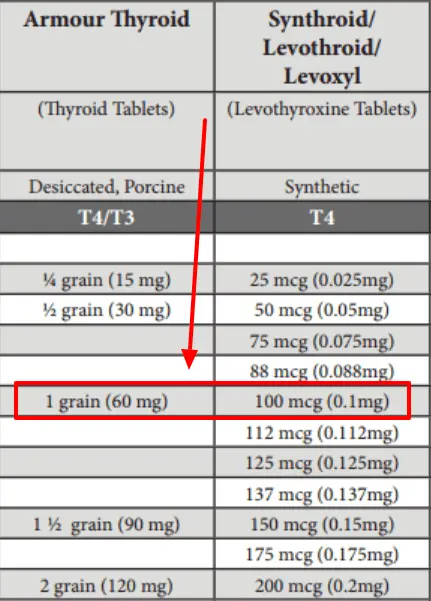
That means 1 grain of NDT contains about 65mcg of T4 equivalents which is MUCH less than the dose of T4 you were originally taking.
This means that your doctor (unintentionally, most likely) underdosed you during the transition.
And this underdosing accounts for ALL of your symptoms and the rise in your TSH.
There’s no problem here at all. It would be the same as if your doctor dropped your dose from 100mcg of T4 to about 70mcg of T4.
This would elicit the same exact response from your body.
The hard part is getting your doctor to not only prescribe the medication but to also use it correctly.
Do the Pros Outweigh the Cons?
I don’t want to leave you thinking that I don’t like NDT as a medication to treat hypothyroidism.
On the contrary, I actually really like these medications and use them frequently.
But, it’s important to address and at least think about the potential negative effects of all medications before you jump into using them.
If you do this, you will be able to be in a situation to better figure out what is best for YOUR body.
So, while I’ve spent a lot of time talking about the potential drawbacks of using NDT, there are still many other benefits to using them as well.
Some of the many benefits include:
- The addition of T3 in each dose – This can be both an advantage and a disadvantage depending on YOUR body.
- The addition of other thyroid hormones including T1 and T2 – This is especially important for those who have had their thyroid removed.
- The addition of other proteins and enzymes from the desiccated thyroid gland – It’s possible that these proteins may enhance the effectiveness of NDT.
- The fact that these medications are not “synthetic” – Synthetic hormones are created in a laboratory whereas NDT is derived from a “natural” source.
In many cases, the pros actually may outweigh the cons of using NDT.
But the point is, you won’t be able to know unless you give it a try.
My recommendation is to consider using NDT, especially in situations where you are already taking some form of thyroid medication but not feeling up to 100%.
The truth is, if you are hypothyroid (and this includes those with Hashimoto’s and those without a thyroid) and you are taking thyroid medication, then you should NOT experience the symptoms of hypothyroidism.
That means your energy level should be normal, your weight should be ideal, your hair should be growing, you should not feel cold all of the time, and so on.
The presence of these symptoms may indicate that your thyroid medication is not optimal, and you can confirm this with specific thyroid tests.
NDT can certainly be used as a first-line thyroid medication in place of Synthroid or levothyroxine, or it can be used as a second-line therapy in the event that you’ve already tried and failed other thyroid medications.
Final Thoughts
If you aren’t sure if NDT is for you, then I would encourage you to continue to read more about these medications.
NDT comes in many formulations and types and each one is slightly different than the other.
Some are better absorbed than others. Some contain fewer inactive fillers than others. Some can be harder to digest than others and so on.
Now I want to hear from you:
Have you tried using NDT before?
Did it work for you? Why or why not?
What type of symptoms did you experience?
How did your lab tests respond?
Leave your questions or comments below!
